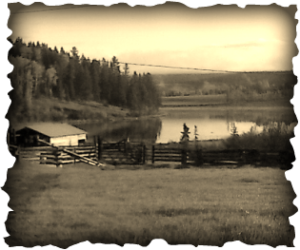March break was second only to summer break when I was a kid, and only because it was a good six-weeks shorter in duration. And a whole lot colder. Especially on the Ranch.
March didn’t just signal a break from school for me; it heralded a trip to BC’s interior to visit my aunt and uncle who’d bought my grandparent’s cattle ranch when Grandma and Grandpa retired. March meant calving season.
Sometimes I volunteered for the late-night cow-check. It hurt to drag my stunned body out from under a thick pile of quilts into air so frosty I could see my breath, to haul on jeans and sweater on over my long johns, and hasten downstairs to make use of the facilities, before shoving my feet and hands into thick warm boots and gloves and tugging on a coat and toque to join my aunt, uncle, or dad on the late-night/early-morning crunch through snow to the dark, wooded and frozen patty-pocked enclosure where cows due to calve were kept, nothing but a flashlight and quick moves to guard against ornery bovines. I tried not to think about the origin of the howls we’d hear some nights, as I trained the flashlight beam on cows’ hind ends. 
It was exciting to find a newborn calf safely delivered in the two-hours since the last walk-through; nothing more terrifying than to find a cow in distress, laboring to deliver a breech or transverse calf. That was when I was sent running through the darkness to wake the other adults, so we could all gently encourage the cow to make the walk to the barns pictured here, where Aunt, Uncle, and my dad would work to help the cow safely deliver her calf.
It was a delicate, dirty–and for me, frightening–job as I held the flashlight and listened to the cow bawl as Aunt kept her haltered tight to a post, and dad twisted the cow’s tail to one side to prevent her kicking, while Uncle, stripped to the waist and scrubbed fingertip to shoulder routed around inside the cow looking for a second hind leg to attach the pull, or desperately trying to shift the calf so it would turn front, or backwards; it didn’t matter, so long as it was in a position to be pulled out. And when that wet, knobby-kneed calf finally hit the straw… relief. Unless the calf wasn’t breathing.
My uncle is not a big man. But back then, he was bull strong, one of the perk s of spending long days attached to the working ends of hay bales, shovels, hammers, horses, plows and cows. When a calf failed to breathe after landing in the straw, he’d grab it by its hind legs, lift it high, and swing it back and forth to encourage phlegm and birth fluids to drain; then he and Aunt would wipe clear mucus from the calf’s nose and mouth, and Uncle would blow in the calf’s nostrils. If that didn’t engender a response, up by the hind legs went the calf again, and once lowered, a round of chest pounds and nostril blows. Most of the time, the calf gasped to life. Sometimes, one didn’t. A sad, but honest part of ranch life. The part that never failed to make me cry.
Ranching isn’t for everyone. And for some, it’s everything. As Jake, the hero in my soon-to-be-released novel, My Dear One, states to the heroine, Dianna:
“It sounds idyllic,” Mr. Douglas said. “But it’s really a helluva a lot of work.” He was stretched out on the other side of the warmer, his good hand tucked behind his head and injured arm braced on his broad chest, his gaze on the shadowed gloom above. “I only told you about the good memories from my childhood, but trust me, it’s not all star-dusted evenings and grassy summer picnics. There’s a lot of strife and heartache, blowing snow and dry watering holes, backache and broken bones… “
“You love it,” she said. “Despite all the difficult things, heartache and strife, you love what you do.”
He nodded. “I most certainly do.”
“You’re mad.”
He grinned. “As they come. It’s the only way to make it in this business.”
I was fortunate to escape all my adventures on the ranch intact, and uninjured. Jake and Dianna aren’t so lucky. But, like the ranchers I know and love do, they work together to not only survive, but to overcome and thrive.
My aunt and uncle are in their seventies. They no longer raise cattle–they can afford not to. Yet they’re still on the ranch, working every day, and last I asked, they’d have it no other way.
Deborah
Men who have attained things worth having in this world have worked while others idled, have persevered when others gave up in despair, have practiced early in life the valuable habits of self-denial, industry, and singleness of purpose. As a result, they enjoy later in life the success so often erroneously attributed to good luck. ~Grenvill Kleiser
